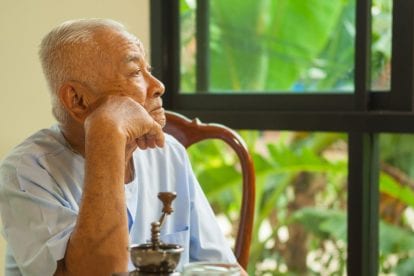How Can I Stop Taking Ambien for Good? Tips for Healthy Sleep

It is possible to quit your Ambien addiction, but it’s important to do so safely. Medical detox can help you comfortably manage withdrawal symptoms and begin lasting recovery. In the process, you can develop healthy sleep hygiene practices for rejuvenating rest you can depend on.
Perhaps the thought has crossed your mind that, eventually, you’ll have to quit the sleeping pills. But the big question is how—how can I stop taking Ambien?
Does this serious problem keep getting bumped down on your to-do list? Are you able to justify the delay because of big barriers like insomnia, too much stress, and the rough prospect of withdrawal? The barriers are real but not impenetrable.
The risks of not getting help are also very real and very dangerous. Continued Ambien use could lead to the following side effects:
- Dependence and addiction
- Sleepwalking, sleep-driving, and other risky behaviors while asleep
- Higher tolerance and the need for larger doses
- Overdose
- Abuse of other substances and dangerous combinations of substances
- Self-harm
- Memory disturbances
- Dizziness
- Drowsiness
- Headaches
Z-drugs, such as Ambien, Lunesta, and Sonata, are not intended to be used for the long term. But, in just a couple of short weeks, a person can develop a dependence on these prescription sleeping pills. And it takes professional treatment to break the risky habit safely and find healthy sleep again.
Navigating Withdrawal: How Can I Stop Taking Ambien Safely?
The withdrawal symptoms can be serious when you stop taking Ambien or the generic zolpidem. At the very least, the withdrawal symptoms are uncomfortable—perhaps unbearable—and they make quitting extremely difficult if you’re attempting to do so on your own. These Ambien withdrawal symptoms can include:
- Insomnia
- Anxiety
- Mood swings
- Panic attacks
- Confusion
- Physical and psychological cravings
- Stomach upset
- Nausea and vomiting
- An increased heart rate
- Seizures
- Psychosis
Many of these symptoms pose real health risks, so it’s critical that you undergo a medically supervised detox to slowly taper off of the drug. Medical detox in a clinical treatment center is the best way to stop taking Ambien as safely and comfortably as possible. In this setting, you are supported with healthy food, relaxation therapies, psychotherapy, and, of course, medical supervision to monitor any severe symptoms.
It’s also important to note that, in this context, there is a strong focus on long-term recovery. Safe medical detox is only the first step. Addiction treatment is another vital part of the journey because—beyond just being drug-free—you want your life back. It’s important to acknowledge that addiction relapse is possible, and there are ways to fortify your coping skills and healthy sleep habits to prevent future problems. All of these proactive measures can take place in an integrative luxury treatment center. And after the conclusion of your program, you’ll return home with lasting resources and support for your positive new practices.
Hope is Just a Phone Call Away
866-922-13503 Important Tips for Healthy Sleep
While we take for granted regular personal hygiene practices—such as teeth brushing and bathing—we don’t give as much credit to the importance of sleep hygiene. It is not uncommon for people to face difficulties falling and staying asleep, but good sleep hygiene can make a positive difference. Here are a few tips to help you jump-start your own sleep hygiene practices even as you’re untangling your Ambien addiction.
1 – Begin Cognitive Behavioral Therapy (CBT)
Cognitive behavioral therapy is an effective technique for insomnia and can be a perfect guiding light in early recovery. This therapeutic approach helps you to explore the underlying thoughts and behaviors that get in the way of your sleep. CBT helps to heal your insomnia from the inside out. And it helps you to overcome the belief that you need the drug—and that you need to search for another drug after this one is gone. Cognitive behavioral therapy for insomnia (CBT-I) empowers you to take your healthy sleep hygiene into your own hands.
2 – Develop a Familiar, Relaxing Bedtime Routine
A therapist can also help you develop relaxing bedtime routines to promote deep, regular sleep. And they can help you to stick to these routines. Practice might include:
- Reserving the bedroom for sleep only
- Turning the lights low a couple hours before bed
- Setting the thermostat to a cool, comfortable temperature
- Making some calming tea
- Doing some meditation or muscle relaxation exercises
- Reading a book in bed in the thirty minutes before sleep
- Going to sleep and waking up at the same times every day, ensuring an adequate amount of rest
- Using a mobile app that tracks your sleep or keeping a sleep diary
3 – Avoid Practices That Negatively Affect Your Ability to Sleep
It is not a myth that watching TV or using your cell phone before bed can disrupt your ability to fall asleep. In fact, it’s a good idea to turn off all electronics within the last hour or two before bed. You also want to avoid stressful activities and thoughts in that time. So, no paying bills or solving other conflicts; you’ll be in a better mental state to handle these things in the morning anyway. Avoid caffeine in the afternoon or later. Limit your naps or avoid them altogether during the day so you’ll be sufficiently tired at your regular bedtime. And identify if there are any foods that tend to give you indigestion or otherwise disrupt your sleep if you eat them too close to sleep. Generally, it’s good to avoid heavy, fatty, fried, spicy, and citrus foods when you don’t have adequate time to digest before bedtime.
The most successful strategy is to kickstart these habits is while you’re in residential treatment. Here, you can give different practices a try before fully committing to your routine. You can lean on the inspiration and positive perspective of the hopeful recovery environment. And you can build up your confidence before you return to your regular life and the stressors that will inevitably arise there. For lasting recovery, you’re committing to positive sleep hygiene for the long term. This powerful start to your recovery can make all the difference for your bright future.
Alta Mira offers comprehensive treatment for people struggling with drug and alcohol addiction as well as co-occurring mental health disorders and process addictions. Contact us to learn more about our renowned treatment programs and how we can help you or your loved one find lasting recovery.






